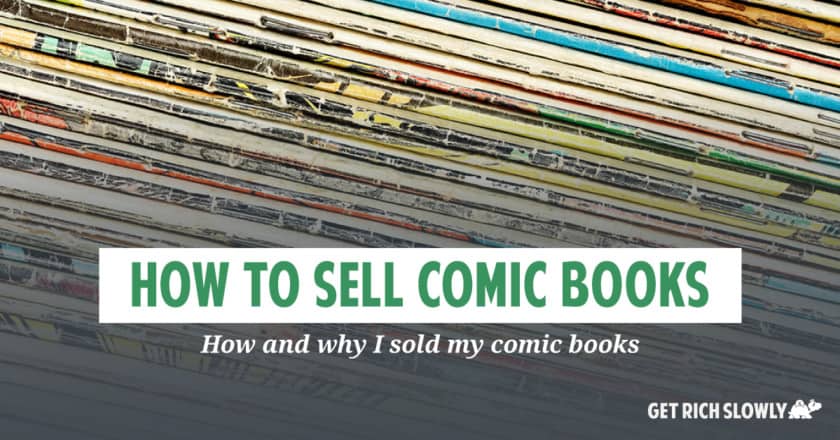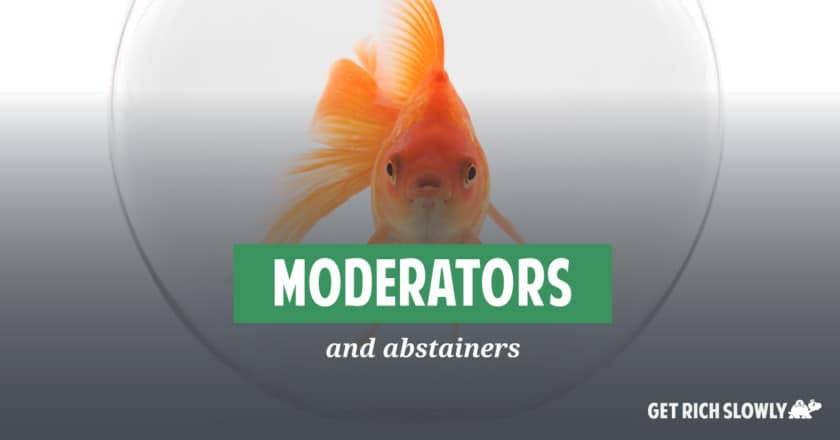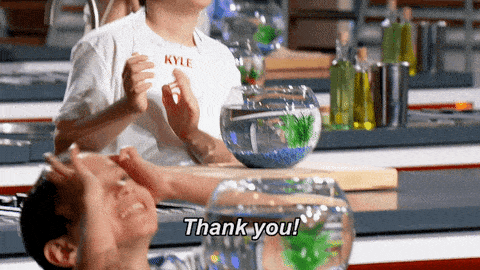How to sell comic books (and why I did)

It's fun to meet readers for coffee or lunch. It used to seem a little strange that random strangers knew so much about my life, but nowadays it just makes conversations easier.
People always want to know about three things:
- How's Kris, my ex-wife? (Answer: Kris is fine. We see each other often. I help her with tech stuff and share my Portland Timbers tickets with her and her boyfriend. She gives me pickles.)
- How are the cats? (Answer: The cats are also fine. They all live with Kris. They're getting older and fatter and lazier, as cats will do.)
- How's my comic book collection?
The answer to that last question is actually vastly more complicated than the answers to the first two. You see, I've (almost) given up comics completely.
Book Review: The Skinny on Real-Estate Investing
Book Week at Get Rich Slowly comes to a close today. Well, I guess tomorrow's Ask the Readers is about books, but this is the final review. I've saved the best for last.
Over the past year, I've had a chance to read several titles in the "Skinny On" book series. And although I've only mentioned them in passing here at GRS, I love these books. Today I want to tell you about them.
The skinny on "The Skinny On"
Each of the "Skinny On" books follows the same format. The story is told in comic-book style using simple stick figures and line drawings. Every book tackles some personal finance or personal-development topic (credit cards, time management, and so on) by following the story of Billy and Beth, a couple with a problem. To help them solve the problem, author Jim Randel enters the story (as another stick figure) and talks through the best advice on the subject.
Free comics from the federal reserve
Many frugal folks are geeks at heart. Now you can indulge both sides of your personality with comic books from the Federal Reserve Bank!
The Federal Reserve Bank of New York has been publishing educational cartoon-style booklets since the 1950s. "The Story of the Federal Reserve System" is one of ten titles currently available. The comic book is intended for the general public, especially students in high school and introductory-level college economic courses.
Up to 35 copies of each comic book are available free. Additional copies are 25 cents each, with exceptions for classroom use. To order, write to the Public Information Department, Federal Reserve Bank of New York, 33 Liberty Street, New York, New York 10045. These publications can also be ordered online.
Every purchase is a trade-off
While I was digging out of debt, I cut back on my comic book habit. I'd been spending a mind-boggling $250 every month on comics — most of which I bought in the form of hard-bound compilations — but for a few of years, I slashed that to less than $50 a month. I also cut my book spending from $100 per month to $50 per month.
In other words, I made trade-offs. I decided repaying my debt was more important, so I put off buying books and comics until later.
Here's the thing: Every purchase is a trade-off. Maybe it's more obvious with discretionary expenses, such as books and gym memberships and cable television. But you're making trade-offs even when you buy the things you need. When you buy food for your family, you're giving up other things you might really want, like new furniture or a car repair. And if you choose to go into debt, you're trading your future income in order to have the things you want today.
Using Quicken to Analyze and Correct Bad Spending Habits
Comic books have always been one of my money demons. Geeky, but true. I used to buy the actual comic magazines: Superman, Spider-Man, X-Men. As an adult, however, I graduated from spending just a buck or two for a comic to buying hardbound compilations and trade paperbacks costing $20, $50, or more.
No matter how smart my money choices, I've made it a priority to keep detailed records of my finances. Tonight I dug through four years of Quicken data to see if my comic book spending habits have changed. (They feel like they have, but I wasn't sure.) Here's what I found:
- In 2004, I spent $1640.10 on comic books. That fall, I decided I wanted to eliminate my debt.
- Apparently my finances weren't a big priority, though. In 2005, I spent $2810.52 on comics.
- My spending peaked in 2006, during which I spent $3,202.91 on my beloved DC Archives and Marvel Masterworks.
- This year, however, I've only spent $807.89 on comics!
My worst period of comic book spending came just before I started Get Rich Slowly. From October 2005 to March 2006, I spent $3519.34 on comics — almost $600 a month. (That money would nearly have been enough to fully fund a Roth IRA!) During this time, I was spending everything I had freed from paying off debts — and my Christmas bonus! — to buy comics.
<How to use barriers and pre-commitment to do the right things with your money
Three thousand years ago, there lived a great hero named Ulysses (or Odysseus, if you prefer), king of Ithaca, champion of the Trojan War, and, it turns out, pioneer of personal finance.
Ulysses wrestled Ajax, retrieved the body of Achilles (the hero shot in his heel), and devised the clever Trojan horse, which allowed the Greek army to infiltrate Troy and end the decade-long struggle.
When the conflict was over, Ulysses spent another ten years desperately trying to sail home to Ithaca. He visited the lotus-eaters, was captured by (and escaped from) the cyclops, evaded both cannibals and the witch-god Circe. He slipped past the six-headed monster Scylla and the whirlpool called Charybdis. After all these troubles (and more!), Ulysses reached Ithaca and regained his throne.
How would you sell a Barbie doll collection?
I am a collector. I always have been. When I was a boy, my parents gave me one closet in the trailer house to have as my very own. They called it the "rat's nest" because I'd fill it up with all the sorts of things a boy might collect: bugs and twigs and baseball cards and comic books, among other things.
As an adult, I've remained a collector. It's both a joy and curse. I love collecting, but I recognize that it's a drain on my finances and a source of Stuff. (I have a finished post about how to build a collection without breaking the bank, but I've never seen fit to publish it. It seems wrong to encourage this sort of hobby.)
That said, the other side of collecting seems like a great topic for Get Rich Slowly. How do you sell a collection? How do you get rid of it? That's what Jenny wants to know. Here's her question:
Seven money strategies to master this year
It's that time of year again. After several weeks of over-indulgence, people are coming to their senses and realizing it's time to make changes for the better. Some -- like me -- have decided to improve their relationships with food and exercise. They've resolved to eat well, drink less, and move more. Others have decided that 2017 is the year they'll take charge of their finances.
If you are one of those determined to make this the year you become the boss of your own life (or if you've been on that path for a while and simply need a shot in the arm), here's an overview of seven smart strategies to improve your financial position.
These aren't just arbitrary suggestions. I've been reading and writing about money for more than a decade now. Based on my experience -- and based on thousands of conversations with other people -- these are seven specific strategies that work.
Moderators and abstainers

When I was a boy, I told my father I wanted a fish. I meant that I wanted a little orange goldfish in a small bowl that might live on the kitchen counter, just like other kids have. My dad knew that. But instead of buying me a goldfish, he went to the pet shop and purchased a 20-gallon aquarium with a bunch of expensive tropical fish.
The fish were fun for a day, but I was seven or eight or nine years old. I lost interest quickly. The fish became more of a nuisance than a novelty. And, eventually, one of us three boys -- I can't remember which -- broke the tank, and then we had no more fish.

My experience with the KonMari method (and the life-changing magic of tidying up)

Because I'm a money nerd and a comics nerd, one of my favorite things is when these two obsessions come together in the form of (drom roll, please): financial graphic novels!
You might think that's a niche I just invented, but you'd be wrong. I'll admit that financial graphic novels aren't common, but they are out there. I've written before about the comics adaptation of Studs Terkel's Working, for instance. But I also own comic book versions of Think and Grow Rich, The Long Tail, The Alchemist, and Robert Caldini's Influence.
My dream project? Collaborating with an artist to create a visual version of my A Brief Guide to Financial Freedom.